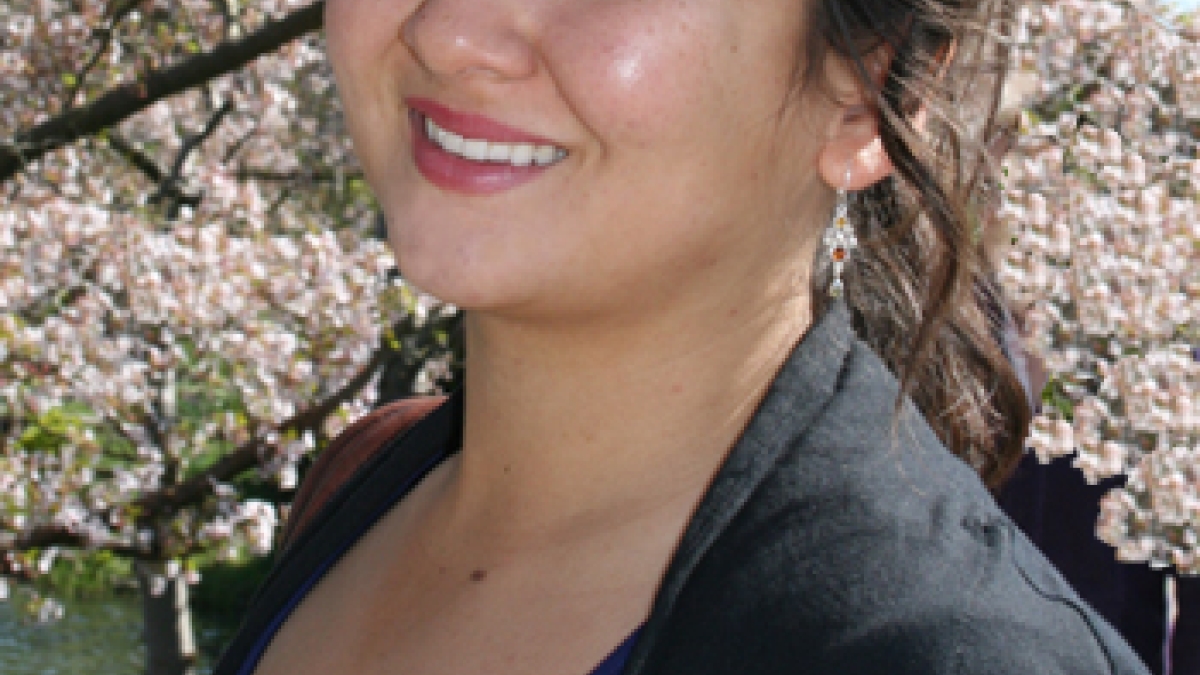Alumna takes on triple role as museum educator

Kristin Hsueh graduated from Arizona State University in 2010 with not one, not two, but three undergraduate degrees. So, how does such a multitasker begin her career? With not one, not two, but three jobs.
Hsueh – who received bachelor’s degrees in anthropology, conservation biology and history with a minor in art history – found her niche as an educator at three valley museums. She works in educational programming at the Arizona Museum of Natural History, as an education intern at the Musical Instrument Museum and as a garden educator at the Desert Botanical Garden.
At the Arizona Museum of Natural History, Hsueh creates new programs and focuses on making learning more enjoyable for children and parents alike. This year, she introduced a series of overnight programs called “Night at the Museum,” which encourages children 6-12 to explore subjects like dinosaurs and ice age creatures while getting a behind-the-scenes look at the museum and the chance to camp out in their favorite sections.
Hsueh also helps manage the Exploration Station, the hands-on center of the museum, where children explore and experiment with magnets, fossils, geology and changing exhibits, such as the upcoming offering, “Hubble Space Telescope: New Views of the Universe,” opening July 22.
In addition, Hsueh was instrumental in planning this year’s summer classes for preschool and elementary age students, and will create lessons and activities for children up to junior high age for the Southwest Paleontological Society’s evening lab nights, beginning in August.
“Kristin is a marvelous person to work with,” praised Tom Wilson, director of the Arizona Museum of Natural History. “She is smart, focused and dedicated. She has a wonderful way of explaining the science of natural history to visitors of all ages and is, therefore, an effective educator and a terrific ambassador for the museum.”
At the Musical Instrument Museum, Hsueh teaches the craft portion of the summer tours for pre-kindergarten to high school children. She also helps plan crafts for summer events and assists visiting artists and musicians. Currently, she is working on educational activities for the museum’s Elvis Week in August and the Dia de los Muertos celebration in November.
In the fall, Hsueh will resume educator duties at the Desert Botanical Garden, taking school and scout troops on tours and assisting with special events. She’s looking forward to the installation of several oversized insect sculptures and the reaction of children to the pieces. She sees David Rogers’ “Big Bugs” exhibit as yet another fun way in which the garden connects children to their environment, in this case by spurring discussion about the importance of pollinators and other creatures that promote decomposition.
“I love how the Desert Botanical Garden gives students the opportunity to get out of the classroom and spend time in a more natural environment,” she explained. “Being in the middle of the city, it is beneficial for children of all ages to spend time outside and explore nature.”
Hsueh also benefits from her time at the garden, as well as her other work locations. “I feel lucky to have had the opportunity to experience three very different but remarkable museums,” she said. She is especially appreciative of the program development opportunities at the Arizona Museum of Natural History and her experience with a large venue like the Musical Instrument Museum, where she has learned that “coordination and cooperation of different departments is essential to make even the simplest event a success.”
Hsueh began her career path in ASU’s agribusiness/pre-veterinary track at the Polytechnic campus. She switched to conservation biology early in her first semester and soon added anthropology as a double major. That turned into a triple major in history after she took an exceptionally interesting course on the Reformation. Eventually, she added art history as a minor.
Professor Mark von Hagen, director of the School of Historical, Philosophical and Religious Studies in the College of Liberal Arts and Sciences, remembers Hsueh as an exemplary student. He said, “She enrolled in my upper-level undergraduate Soviet history course, a subject seemingly far removed from her usual interests – though given the number of majors and minors she has accumulated, there might not be anything distant from her interests – and found something that got her engaged with the subject. Students like Kristin make our days bright.”
Now that Hsueh has swapped her student status for that of educator, she plans to further her career in museum education and hopes to remain in a natural history museum, since the setting employs all of her degrees and interests.
She has sound advice for students who worry about successfully transitioning to the work world. “Take your education into your own hands,” she said. “Go the extra mile and volunteer in labs on campus. Take every opportunity to gain experience; it will help you in the long run. Most importantly, be appreciative to the professors or professionals who help you. This will help you network in your field and make others more willing to work with you.”